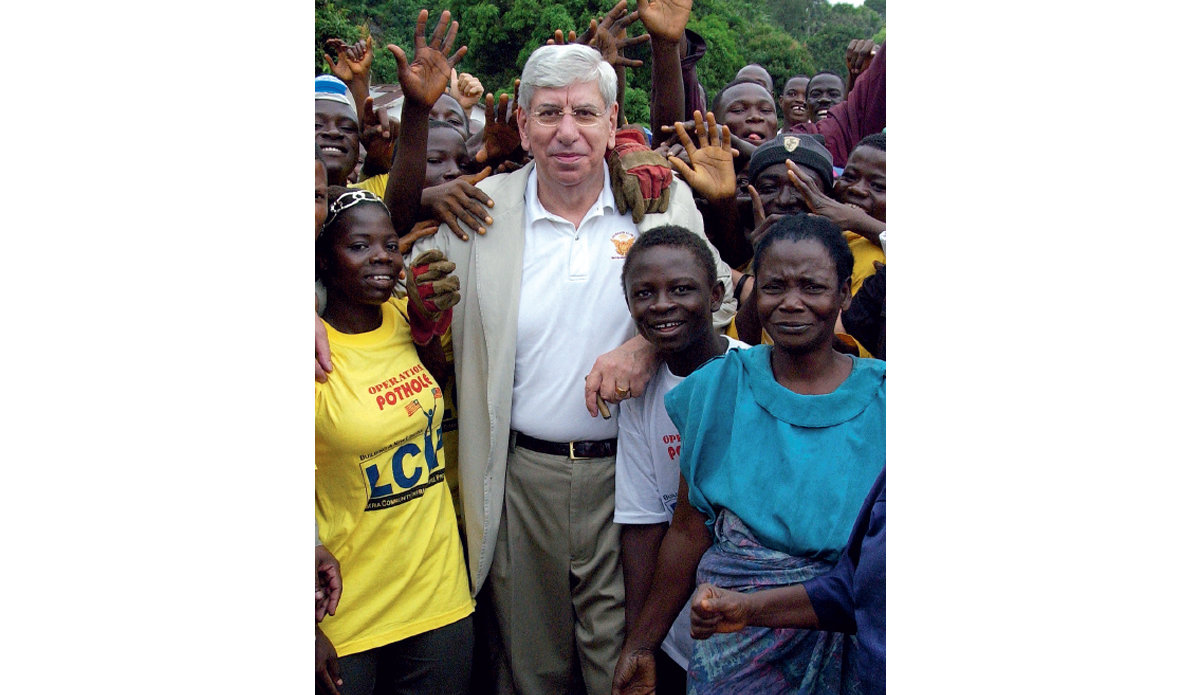Earning respect at the Mission’s outset | Jacques Paul Klein, Under-Secretary-General, Special Representative of the Secretary-General (2003-2005)

Jacques Paul Klein arrived in Monrovia in October 2003 as the Mission’s first Special Representative of the Secretary-General (then, Kofi Annan). With the flight of former president Charles Taylor to Nigeria, the parties in the Liberian civil war were able to come to a ceasefire agreement that paved the way for a UN peacekeeping operation.
A larger than life, cigar-smoking former US State Department official and Air Force major-general who had previously led UN peacekeeping missions in Bosnia-Herzegovina and Croatia. Klein’s tough message to any faction that aspired to violating the Accra agreement was credited with maintaining stability, while tensions remained raw.
“Klein came to earn the respect of Liberians for his no-nonsense ways and his unequivocal refusal to play favorites among the warring factions,” wrote former President Ellen Johnson Sirleaf in her autobiography. “When skirmishes in Nimba between former Government soldiers and MODEL endangered both civilians and the peace agreement, Klein sent out patrols to fly over the area and threatened, essentially to shoot anyone caught warmongering. The skirmishes stopped. “
At the time, with 15,000 peacekeepers, 1,115 police officers and nearly 2,000 civilian staff members, UNMIL was the largest peacekeeping operation going, with a budget of US$800 million. Yet Mr. Klein had to argue at the UN for further funding for the rehabilitation and reintegration of ex-combatants when donor funds lagged.
When some said the country wasn’t ready for the first round of DDR, he told a reporter in 2005: “My philosophy has always been lead, follow, or get out of my way. Because my goal was to save Liberia.”
The Mission’s goal was to re-establish the rule of law and hold free and fair elections. During Klein’s tenure as the first SRSG, the Mission disarmed and demobilized some 106,000 fighters. UNMIL helped to extend state authority throughout Liberia and along its borders. The Mission helped the Government to begin to reform and restructure the police, prison system and courts.
Some 350,000 refugees returned home from neighboring states, and the UN assisted some 450,000 internally displaced persons in returning to their homes. At the same time, under the UN’s purview, 659,000 people received daily food, and 1.4 million children were immunized against measles and polio.
The Mission registered 1.3 million voters who in December 2005 elected Africa’s first woman president, Ellen Johnson Sirleaf, who took office in January 2006. Mr. Klein continued to lobby after his departure for further restructuring of the security forces, strengthening of the judiciary, decentralization and other constitutional reforms.
“Liberia still has a long way to go,” he said in January 2017. “The Liberia-American versus native Liberian population tensions, illiteracy and the lack of substantial foreign investment continue to undermine Liberia’s future.”
As for UNMIL, which was deployed for another 12 years after his departure, he credits the thousands of personnel who served the UN in Liberia and said that, “With three presidential elections and the re-establishment of the rule of law, the Mission was a success.”
Mr. Klein has continued to speak, write and consult on international affairs.
 UN
UN United Nations Peacekeeping
United Nations Peacekeeping





